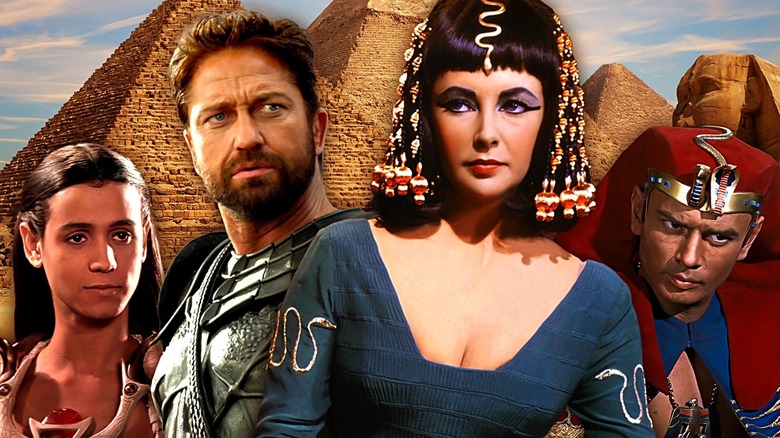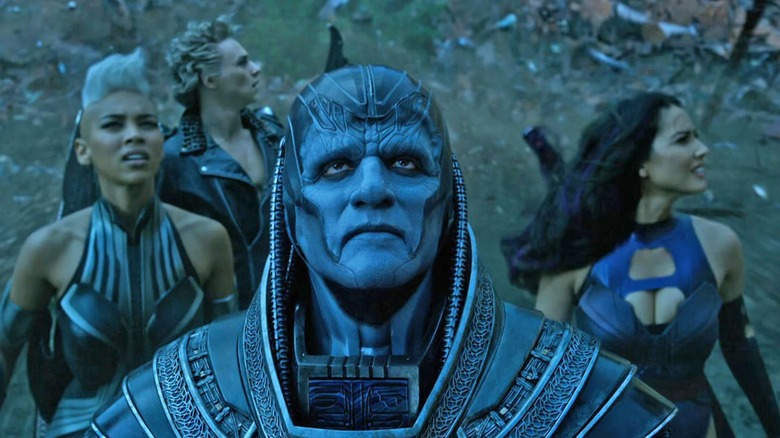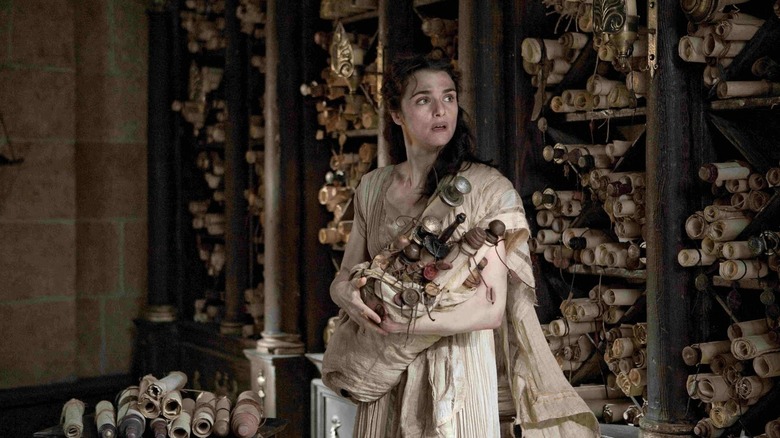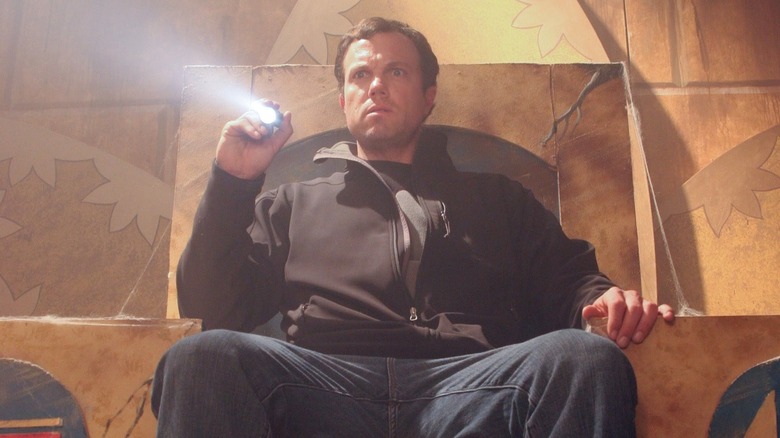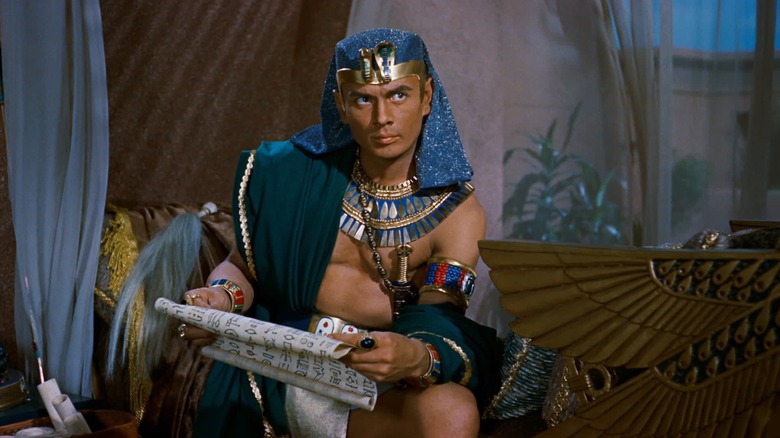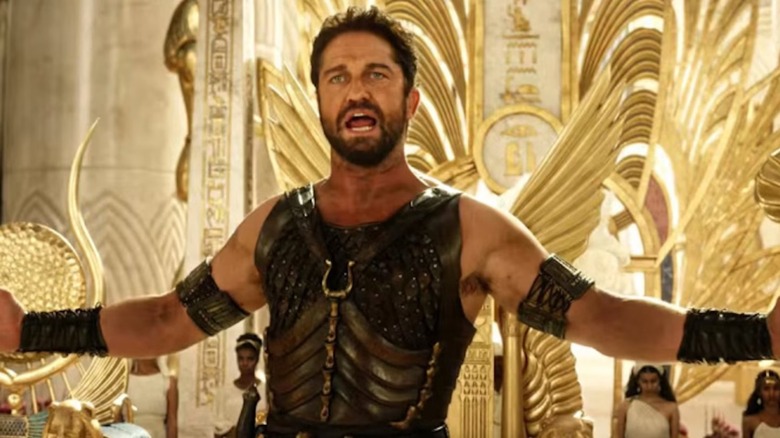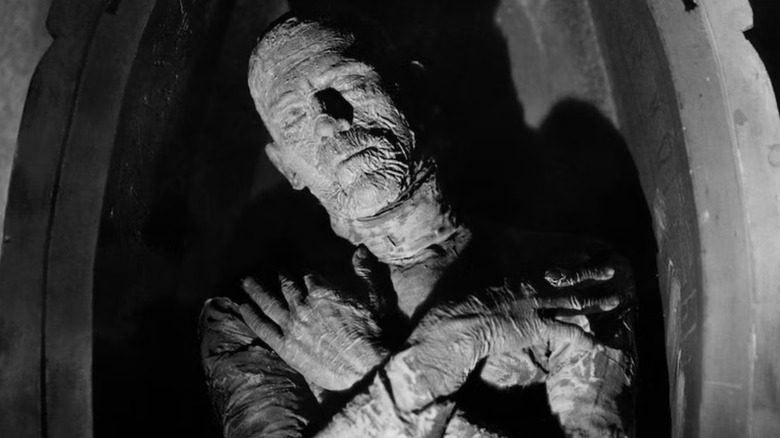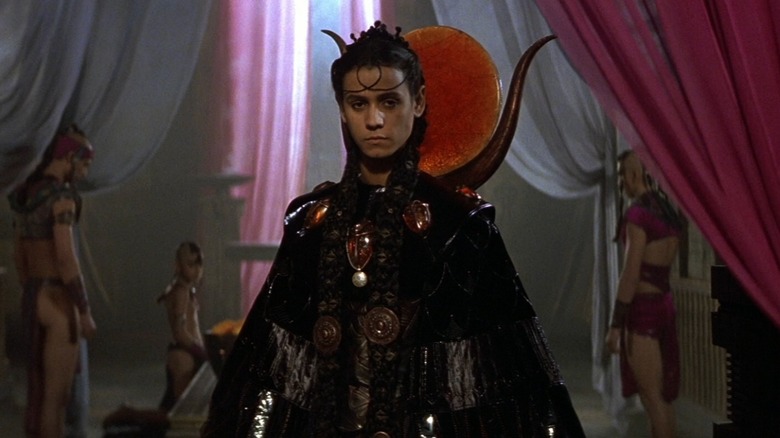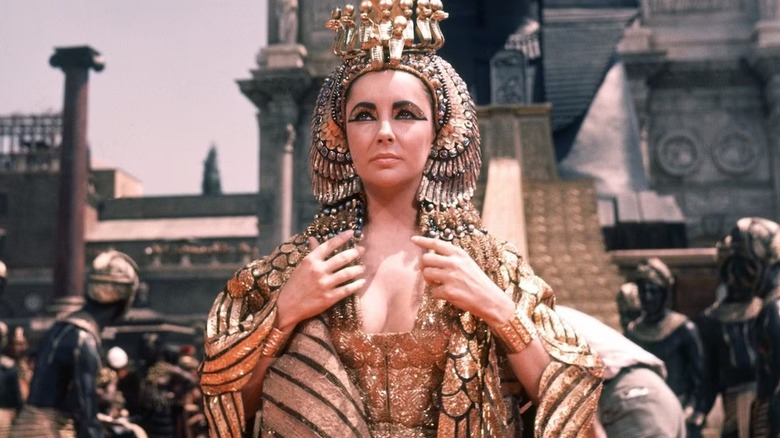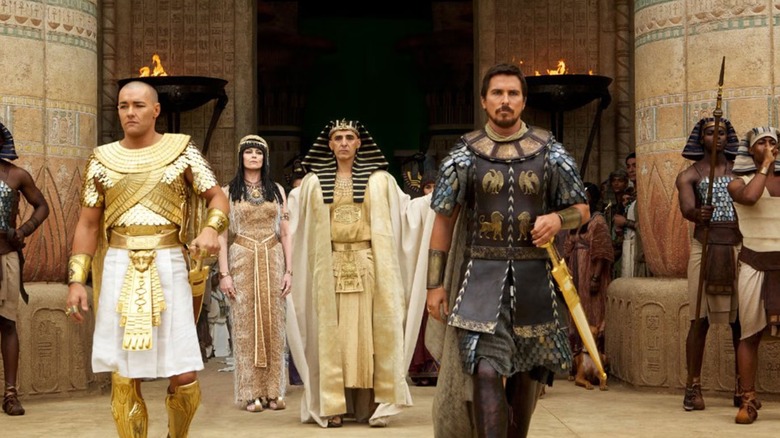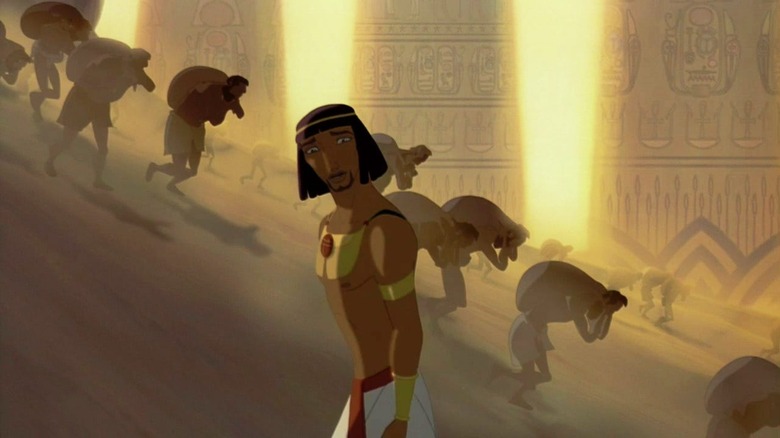The 5 Best & 5 Worst Movies About Ancient Egypt
While the world has been fascinated with the mysteries of ancient Egypt since Howard Carter and Lord Carnarvon stole all the credit for the glorious reveal of Tutankhamun's tomb in 1922 from the local diggers and historians, the truth of those mysteries rest better in the hands of Egyptians today. And there are still mysteries and wonders aplenty, from the way its colorful mythology slowly blended — syncretized — with the Roman occupiers that gradually wore away the country's golden monarchy, to its early understandings of science and math that remain lost.
It's a tough period of time for amateur historians who love the occasional pop culture dive; unlike other history buffs with their Medieval costume dramas and the upcoming Christopher Nolan-helmed version of "The Odyssey," there's not much that truly digs into the dynastic periods of Egypt. It's mostly Biblical-era epics, the occasional Roman overlap, and some hilariously bad science fiction that plays with disappointing and racist tropes. But there are a few films worth watching, and a few worth a good chuckle, and that's what we're going to dig for today.
Worst: X-Men: Age of Apocalypse
It's silly to go too far with critiquing a comic book movie for bad history, and we won't, but "X-Men: Age of Apocalypse" takes a few glances back at En Sabah Nur's ancient history. For as progressive as the X-Men can be, this is a grim moment for the franchise. History's first mutant and dark pharaoh, better known as Apocalypse (played by Oscar Isaac), takes the usual mutant's place as a victim of bigotry and hate and turns it into a riff on the ancient aliens conspiracy theory that haunts Egyptology.
We'll revisit the ancient aliens problem in a little while, as that's far from the biggest issue with this film. The costuming is uninspired, with even the X-Men looking cheesier than usual. The setting is inadequate, with a series of heavy-CGI shots of Apocalypse resurfacing Cairo that look about the exact shade of brown as "Raiders of the Lost Ark." Egypt has its issues in the modern day, but it looks better than a "Call of Duty" map, we promise. The actual worst issue here? It's not even a halfway decent adaptation of the "Age of Apocalypse" comic storyline, stinking so badly that a Mr. Sinister-led follow-up was, probably thankfully, canned in the cradle.
Best: Agora
If we had a nickel for every time Oscar Isaac (who is still likely to return as "Moon Knight") was in an Egyptian-themed project, we'd have three nickels. Which is a little weird, but hey, he does his best in all of them. The third and least-known of his projects is the indie darling costume drama "Agora," where he plays a state official and scholar named Orestes, opposite Rachel Weisz as Hypatia of Alexandria, one of our earliest documented female mathematicians.
For our purposes, "Agora" is an edge case when it comes to discussions of archaeological Egypt. It's actually set in the 4th century AD, during the Roman occupation. Like most of the good films we'll be featuring, the rise of the fledgling religion, Christianity, is inescapable. In fact, it's the heart of the film's conflict. Egypt's centuries of entwined science and paganism, and the fear and domination emblematic of Christianity, at this time seal Hypatia's tragic fate as a fact of history. "Agora" is a beautiful, depressing film about an extremely chaotic era of Egypt, and the story of Hypatia's demonization remains relevant.
Worst: Sands of Oblivion
It's easy to get suckered in by "Sands of Oblivion." This mid-2000s SyFy cheapie features an absolutely badass cover of a grimly gleaming black Anubis (the Egyptian judge of the dead and guardian of the crossroads) set against golden sands. For dedicated science fiction souls still flying after "Firefly," it even features Morena Baccarin (currently starring in the surprise hit "Elevation" with Anthony Mackie) and Adam Baldwin. Unfortunately, this film sucks. It's just "The Mummy" (the limp Tom Cruise one that failed to start a movie franchise) by way of "The Ten Commandments," with a little touch of, like, "Yu-Gi-Oh!"
The premise is amusing, anyway: among the thousands of props used when filming "The Ten Commandments" was one real ancient Egyptian artifact. Naturally, it's cursed, despite the fact that Pharaohs and their priests didn't actually do that to royal tombs (regardless of whatever Zahi Hawass says), and the film is off to the races. The obligatory evil undead pharaoh who serves the "evil" Egyptian god Set goes on his obligatory murder spree until the film's runtime is suitable for commercial breaks. Useful trivia: Set is usually demonized, so one reckons a god is used to it. However, Set also steps up for Ra against his apocalyptic trials with the snake-like Apep, who's actually far more animalistic and destructive.
Best: The Ten Commandments
"The Ten Commandments" is a Biblical epic featuring the white-as-paper Charlton Heston as the swarthy Semitic prince Moses, following his journey as he gradually turns away from his adopted life as an Egyptian noble to realize his destiny as God's greatest prophet and deliverer of the Ten Commandments. The only thing funnier than seeing Charlton Heston in his pasted-on Moses beard is seeing him in that cornball '50s ideal of Egyptian pharaonic wear next to the holy-god-he's-built-like-a-Toyota-Hilux Yul Brynner as Ramesses II.
Like so many films, it's not much of an Egyptian epic, but Cecil B. DeMille knew how to film a spectacle, so just set your inner Kemetic (the ancient name for Egypt) pedant aside and enjoy DeMille at the height of his power. Also, be sure to enjoy Yul Brynner, who never phoned in a role in his life, and who spends most of his royal duties shirtless, which is moderately accurate and something to be profoundly grateful for. If you need one more reason to give this classic epic a shot, however, then know that it's key to fully appreciating Mel Brooks' best jokes in "History of the World Part I."
Worst: Gods of Egypt
If you told a Gen X goth kid that Alex Proyas, whose biggest hit, "The Crow," would define their life, would go on to absolutely annihilate Egyptian mythology with the only film more incoherently glitzy than Tarsem's mythological dumpster fire "Immortals," actually, we'd believe you. In one of those little awful ironies, the gods themselves aren't portrayed that badly in "Gods of Egypt," and the broadest strokes are a wee tiny bit accurate.
Unfortunately, with the exception of the beautiful Chadwick Boseman as Thoth (here in his role as sorcerer and scholar) and Elodie Yung as Hathor, Egypt's gods are even whiter than Charlton Heston. Nikolaj Coster-Waldau, who would help carry "Game of Thrones" on his back to the bitter end, is, absurdly, Horus. Bryan Brown, a terrific character actor, is Osiris. Gerard Butler is here as Set, because he's collecting the Infinity Stones of trash, and, in the wildest insult to imagination, Geoffrey Rush is Ra, set highest among all the gods. This thing was supposed to set off a franchise. Thankfully, bombing at the box office put paid to that fate.
There's a Korean boy's love webcomic called "Ennead," where all the Egyptian gods are either trying to kill each other or make out thoroughly enough that print copies are sold in plastic wrap. Go read that instead.
Best: The Mummy (1932)
Boris Karloff's historically hilarious creature feature gives the long-dead (but gruesomely buried alive) priest Imhotep a Francis Ford Coppola's "Bram Stoker's Dracula" storyline where he's looking for his reincarnated lost love at all costs, and it's still the best and most authentically, monstrously romantic movie of the Universal Monsters era. But for Egyptology fans, "The Mummy" is a film of huge historic impact, because it shows how wildly the world reacted to the discovery of King Tutankhamen's tomb ten years earlier. For all its cultural flaws — "The Mummy" unfortunately leans into racist stereotypes of the Middle East — it's a time capsule of the obsession that a boy king's glorious golden mask inspired in the Western world.
A little like "Star Trek," "The Mummy" catapulted modern Egyptology, then a niche field, into a world of pop culture egoism and pulp fiction infamy. It would also go on to inspire one of the best modern cheeseball remakes of all time, with Brendan Fraser as one of cinema's best himbos. He should have won the Academy Award for his role there, not "The Whale." In any case, it's not a bad legacy for a fun movie with some incredible effects work that holds up under today's scrutiny.
Worst: Stargate
Two things can be true: First, "Stargate," the blockbuster that catapulted creators Roland Emmerich and Dean Devlin (who would have a tough relationship with the spin-off series) into Hollywood's go-to disaster porn purveyors, is one of the worst representations of Egyptology and Egyptian history. Second, a lot of us Egyptology nerds own at least, like, five different copies of this stupid thing.
"Stargate" is filmed with gonzo joy, featuring over-the-top effects and cool-as-hell mechanized helmets representing soldiers themed after Horus and Anubis that ensured we doodled Patrick Tatopoulos' concept art all over our high school homework. It's also the movie that reignited the ancient aliens hypothesis so brightly that it would go on to devour The History Channel, and here's where we have to buckle in: this is one of the ugliest, most racist, most disappointing theories in human history.
This theory suggests that human intelligence and ingenuity, especially in non-Western countries, is so improbable that these people had to have received otherworldly assistance to create miracles of historical architecture like the Pyramids of Giza. The truth is beautifully simple: They were built by well-paid workers who were armed with sledges and other basic tools, and, like every good summer project, they were loaded with beer. Thanks for nothing, "Stargate," and I'll see you this weekend.
Best: Cleopatra (1963)
Nothing's specifically wrong with Claudette Colbert's pretty 1934 (like we said, the world was hog-wild for Egypt back then) version of "Cleopatra," you know, besides the wild historical inaccuracies, but for sit-back-and-grin spectacle, you cannot beat the Empress of Costume, the Queen of Camp, 1963's "Cleopatra," directed by Joseph Mankiewicz and starring Liz Taylor with her approximately ten billion wardrobe changes. All of which are straight fire, utterly inaccurate, and killed the budget of this film (and damn near the studio) dead.
"Cleopatra" rewired the brains of every Egyptology nerd born after 1970. Is it a critically good film? That's not the point, although the answer is no. Has the slapfighting over the real Cleopatra's appearance, intelligence, and ancestry ever stopped? Not for a second. Instead, there is a five-minute scene where Cleopatra arrives at the head of a procession that required ten thousand performers, while Elizabeth Taylor is draped in a golden Isis-themed robe and dress that every young girl obsessed with history would have committed capital crimes to own. You owe it to yourself to watch this movie on the biggest TV you can manage. Every penny wasted is on the screen for you to ogle.
Worst: Exodus: Gods and Kings
It's refreshing that Sir Ridley Scott has given up on any pretense of caring about historical accuracy, throwing his bonkers version of history onto the silver screen with a middle finger in the air. At least it's honest. But Sir Ridley was off the grid long before the sharks of "Gladiator II" and whatever he was doing with "Napoleon." "Exodus: Gods and Kings" is yet another whack at Moses, the Ten Commandments, and Ramesses II, and like its predecessors, it's white. White. So ... unabashedly ... white.
To be fair, "Exodus" does feature some performers who can pass as residents of this admittedly travel-heavy African country, with Indira Varma ("Kenobi") as an unnamed priestess and the fantastic Ghassan Massoud returning from his previous Scott collab (Saladin, "Kingdom of Heaven") as the pharaoh's vizier, but the big roles? Yeah, Christian Bale is Moses and Joel Edgerton (also from "Kenobi") is Ramesses II. We love Joel Edgerton as an actor, but a color swatch of his face would match the landlord's white paint in our depressing, overly expensive apartment. "Exodus" fights to be heavy and arty and faithful, and the costuming is somehow worse than DeMille's attempt. DeMille gets the excuse of not having much opportunity to know better. Scott simply doesn't care.
Best: The Prince of Egypt
There's a meme from "The Good Place" that relies on the existential dread that, no matter how many times Michael asks if it's something else for once, Janet is still going to hand him that cactus. Welcome to the very best movie about ancient Egypt. We promise, it's really that great. Now, hold out your hand: It's about Moses and Ramesses II. I know, right?
"The Prince of Egypt" is nonetheless not just one of the best versions of this well-trod story, but a visual spectacle for any age. Traditionally animated by Disney vets for the young Dreamworks studio, scored by Hans Zimmer, and featuring a strong voice cast that features the multi-talented and often hilarious Val Kilmer as Moses (and, uncredited, as a key vocal note in the syncretic voice of God) and Ralph Fiennes as Ramesses II, the movie is a stunner to behold, with love and care in every scene that balances historically simple costuming with color and natural beauty.
Yeah, it ends with the Ten Commandments again, but there's something sumptuous and lovely to admire in every scene, whether it's the Hebrews standing against the Pharaoh, or the estranged brothers amidst the luxury of the palace. It's frustrating that this is the best our favorite historical niche can offer, but "The Prince of Egypt" truly does shine above the rest when it comes to visualizing what once was.
